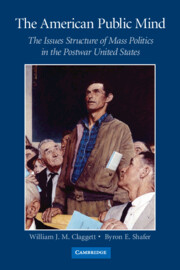3 - The New Issues
Civil Rights
Published online by Cambridge University Press: 05 June 2012
Summary
The grand policy domains that were central to American politics as the Second World War ended, namely social welfare and international relations, were to remain integral to this politics during all the years to follow. Harry Truman and Tom Dewey could argue over Truman's proposed extension of the New Deal in the presidential campaign of 1948, just as George Bush and Al Gore could argue over Bush's proposed reform of its centerpiece, Social Security, in the presidential campaign of 2000. Dwight Eisenhower and Adlai Stevenson could argue over the Cold War in general and Korea policy in particular during the presidential campaign of 1952, just as George Bush and John Kerry could argue over international terrorism in general and Iraq policy in particular during the presidential campaign of 2004.
This is not to say, however, that these two grand and continuing policy realms would continue to occupy the issue space of American politics in the same fashion, in undisputed centrality, across all these years. Sometimes, there were idiosyncratic policy concerns that broke through to influence a specific electoral contest. Though note that it was necessary to possess a more fully developed issue context, along with its measures, even to recognize these as idiosyncratic breakthroughs, in order to know that they were not merely some new incarnation of an established policy alignment.
- Type
- Chapter
- Information
- The American Public MindThe Issues Structure of Mass Politics in the Postwar United States, pp. 74 - 100Publisher: Cambridge University PressPrint publication year: 2010



